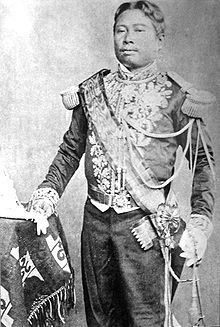Norodom I.
King Norodom ( Khmer ព្រះបាទ នរោត្តម ; * 1834 in Oudong , Cambodia , † April 24, 1904 in Phnom Penh ) was King of Cambodia from 1860 until his death in 1904. The word "norodom" comes from Sanskrit and means "best person" (nar uttam). He is considered to be the first modern King of Cambodia to prevent the country from being completely dissolved by asking France for protection in 1863 .
Life
Norodom was the eldest son of King Ang Duong and half-brother of the princes Si Votha and Sisowath , who would later also become king. At the time of his birth, Cambodia was occupied by both Vietnam and Siam , both of which had divided the country among themselves. The royal family stayed in the Siam-controlled zone because Siam was more reluctant to exercise its territorial claims. The capital of Cambodia at that time was in Oudong , but the real center of power was in Bangkok , where Norodom was sent to study. Here he studied Buddhist scriptures and the ancient Pali language.
government
After King Ang Duong died in 1860, Norodom was his successor, but initially remained uncrowned because the Siamese court refused to surrender the regalia . This ultimately made Norodom a Siamese viceroy over Cambodia.
His father had fought against a Cham rebellion , but died during the first fighting. Norodom lost control of the Cham region, left the old capital Oudong and fled to Battambang . However, Oudong remained as the official capital. As a result, he completely fled Cambodia into exile in Bangkok.
French colony
In 1863 he asked France to act as a protective power for Cambodia, after which he returned to Cambodia. France, with the help of gunboats, forced the king to sign a treaty that made Cambodia a French protectorate . Subsequently, the Siamese under King Mongkut (Rama IV.) Gave permission to hold official coronation ceremonies, which took place in 1864 and which were attended by both French and Siamese officials. Nevertheless, the young king began his reign in veritable turmoil. The Siamese and Vietnamese had always viewed Cambodia as a buffer state , but France saw its opportunity in the growing embrace of the two neighboring states. Cambodia, however, remained weak and became the bone of contention between Siam and France. In addition to normal bands of robbers, rebel groups were also active who wanted to drive the Siamese and Vietnamese - and also the French - out of the country.
In 1885 and 1886, Prince Si Votha, Norodom's half-brother, led a revolt against the French administration, whereupon the French suspected Norodom of promoting it in secret. The revolt ended with Norodom's promise that the French would have made concessions to him. Subsequently, Norodom was able to rule from a certain position of strength.
Following the war between China and France from 1884 to 1885, France formed the French Indochina colony (in October 1887) with Annam , Tonkin , Cochinchina (together today Vietnam) and the Kingdom of Cambodia. As a result, Norodom was more of a puppet than an independent ruler.
Before his death, Norodom named his son, Prince Yukanthor, to succeed him. The French ordered the capital to be moved from Oudong to Phnom Penh. King Norodom died here on April 24, 1904. His body was cremated in 1906 according to Buddhist tradition.
Heir to the throne was not the intended Yukanthor, but his half-brother Sisowath , whom the French considered more docile.
Honors
Norodom received numerous medals, among others
- the Grand Cross of the Legion of Honor (1872)
- the Grand Cross of the Order of the White Elephant (Siam)
- the Grand Cross of the Order of Maha Chakri (Siam)
| predecessor | Office | successor |
|---|---|---|
| Ang Duong |
King of Cambodia 1860 - 1904 |
Sisowath I. |
| personal data | |
|---|---|
| SURNAME | Norodom I. |
| ALTERNATIVE NAMES | ព្រះបាទ នរោត្តម (Khmer) |
| BRIEF DESCRIPTION | Cambodian king |
| DATE OF BIRTH | 1834 |
| PLACE OF BIRTH | Oudong , Cambodia |
| DATE OF DEATH | April 24, 1904 |
| Place of death | Phnom Penh |



